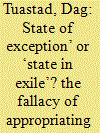| Srl | Item |
| 1 |
ID:
126055


|
|
|
| 2 |
ID:
098758


|
|
|
|
|
| Publication |
2010.
|
| Summary/Abstract |
In this article I investigate the role of the international community's policy in the national factionalism in Palestine. I attempt to illuminate how international policy has contributed to the sustaining of internecine Palestinian violence as Fatah, which lost the elections in 2005 and 2006, has been motivated not to hand over power. In the process of selecting allies in the fight against Islamist terrorism, the epitomic undemocratic feature of Arab political culture, clientelism, has been promoted over democracy. Hamas seizing power in Gaza in 2007 probably resulted from the need to tame unruly militant groups which were sponsored by leaders of the Palestinian Fatah party, which again were supported by Western powers. To understand the national splitting in Palestine there is a need to analyse the interconnection between warlords, local clientelism and international clientelism.
|
|
|
|
|
|
|
|
|
|
|
|
|
|
|
|
| 3 |
ID:
154483


|
|
|
|
|
| Summary/Abstract |
To refer to Palestinian refugee camps as states of exception, appropriating the paradigm of Giorgio Agamben, is definitely tempting. Agamben argues that in times of crisis, individual rights of citizens are diminished and entire categories of people kept outside the political system. Nevertheless, there are flaws in applying Agamben’s perspective on Palestinian camps. It acquits the camp residents from the autonomy over their own political agency. Historically, in Lebanon, camp residents experienced an almost limitless access to free political organisation. But this access has not been converted into the development of representative, legitimate political structures.
|
|
|
|
|
|
|
|
|
|
|
|
|
|
|
|